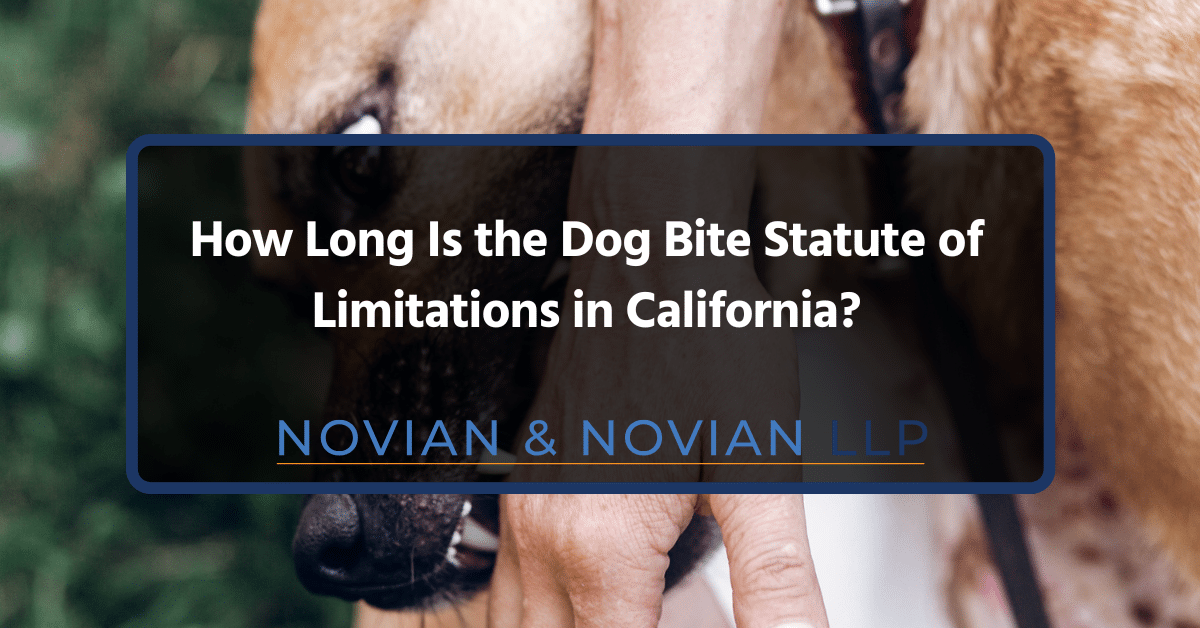If you’ve been bitten or attacked by a dog, it’s crucial to understand the dog bite statute of limitations California law sets. In most cases, victims have two years from the date of the incident to file a personal injury claim. This legal deadline determines how long you have to pursue compensation for medical bills, lost wages, and emotional distress caused by the attack.
Knowing the statute of limitations is essential because once it expires, you lose your right to take legal action, no matter how strong your case may be. Missing this deadline can mean losing your chance at justice and financial recovery.
At Novian & Novian, we’ve been in operation for over 35 years and our experienced dog bite attorneys in California can help you get the compensation you deserve. Contact us today!
In this post, we’ll explain why the statute of limitations matters, what exceptions may apply, and how an experienced dog bite attorney in California can help protect your rights.
Table Of Contents
- How Does California Law Protect Dog Bite Victims?
- What is the Statute of Limitations for Dog Bite Cases in CA?
- Can I Sue for a California Dog Bite After Years?
- What Happens If You Miss Dog Bite Deadline in California?
- How to Protect Your Rights After a Dog Bite Injury in California
- Need Help With Meeting The Deadline for A Dog Bite Claim?
- FAQs
- How Does the Statute of Limitations for Dog Bite Cases in California Compare to Other States?
- Does the Statute of Limitations Apply if the Bite Infection Appears Later?
- What if I Didn’t Know Who Owned the Dog Initially?
- What Is the Average Settlement for a Dog Bite in California?
- What Legal Process Is Involved in Deciding if a Dog Is Dangerous or Vicious in California?
- What Are the Common Defenses to Dog Bite Liability in California?
How Does California Law Protect Dog Bite Victims?
Under California’s dog bite laws, victims are protected by a strict liability rule outlined in California Civil Code Section 3342. This means a dog owner is legally responsible for bite injuries caused by their dog, regardless of the animal’s previous behavior or the owner’s knowledge of aggression. In other words, if a bite occurred while the victim was lawfully on private property or in a public place, the owner is liable for resulting dog bite injuries, medical expenses, and lost wages. A dog bite case under California law typically arises when a dog attacks a person through direct biting, even if the bite doesn’t break the skin but causes other injuries.
Common scenarios that lead to a dog bite claim or dog bite lawsuit include bites that happen on the dog owner’s property, at public parks, or when a dog jumps on someone and causes injury. Police dog incidents or bites during delivery or maintenance work on a property can also fall under California’s dog bite statute.
Since California’s dog bite laws are based on strict liability, the injured person doesn’t need to prove negligence, only that the attack occurred and that they suffered damages. In these personal injury cases, victims can seek compensation for medical bills, medical treatment, lost wages, and emotional distress.
Why Is the Statute of Limitations Important in Dog Bite Cases?
The dog bite statute of limitations California enforces gives victims two years from the date the injury occurred to file a personal injury claim. Missing this statute of limitations can have serious consequences.
Typically, if you fail to file within the legal timeframe, you may lose your right to recover compensation, no matter how severe your injuries or how clear the dog owner’s liability is. There are only a few exceptions to this rule, such as cases involving minors or delayed discovery of the injury.
The California dog bite statute also affects how effectively evidence can be collected. Over time, medical records, animal control reports, and witness statements can be lost or become unreliable, weakening your dog bite lawsuit. Acting promptly after a dog bite incident ensures that critical details such as disease control measures, photos of serious injuries, and records of immediate medical attention are properly documented.
What is the Statute of Limitations for Dog Bite Cases in CA?
Dog bite victims have a limited period to take legal action under the dog bite statute of limitations enforced by California. According to California law, a person who suffers dog bite injuries or other injuries caused by a dog attack generally has two years from the date the bite occurred to file a personal injury claim or dog bite lawsuit. This timeframe applies whether the injury occurred on private property or in a public place, as long as the injured person was lawfully present when the attack occurred.
Since California follows a strict liability rule under California Civil Code Section 3342, a dog owner is responsible for damages even if they had no prior knowledge of their pet’s actions or aggressive behavior. Failing to meet the statute of limitations deadline means the bite victim may lose their right to seek compensation for medical expenses, lost wages, and emotional distress.
Acting within this period also helps preserve medical records, animal control reports, and witness statements that strengthen your dog bite claim. Adhering to California’s dog bite timelines is essential because once the deadline passes, courts will likely dismiss your personal injury lawsuit, leaving you unable to recover compensation for your dog bite injuries.
When Can Dog Bite Deadlines Be Extended in California?
While the California law on dog bites generally limits lawsuits to two years, there are a few exceptions that may extend this timeframe. One common exception is the discovery rule, which applies if the injured person did not immediately realize the extent of their injuries caused by the dog. For example, if medical treatment later reveals a more serious condition such as an infection or disease from the bite, the statute of limitations may begin when the injury was reasonably discovered.
Another exception involves minors. If the bite victim is under 18 when the dog bite incident occurs, California’s statute pauses until they reach legal adulthood, allowing them two years from their 18th birthday to file a personal injury lawsuit. Similarly, the statute may temporarily suspend the timeline if the dog owner leaves the state or attempts to evade legal responsibility.
Lesser-known exceptions may apply when police dogs or other animals under government control are involved, or if the victim’s injuries lead to serious criminal charges against the animal’s owner. In these cases, it’s critical to work with a personal injury attorney who handles dog bite cases and understands how to apply these nuances. An experienced lawyer can gather evidence, manage communication with the insurance company, and ensure all filings meet legal deadlines.
Can I Sue for a California Dog Bite After Years?
In most cases, the dog bite statute of limitations California imposes a strict two-year deadline for filing a dog bite claim. However, there are limited exceptions that may allow victims to pursue a dog bite lawsuit even after several years. These exceptions fall under a legal concept known as “tolling,” which pauses or extends the statute of limitations under specific circumstances.
For example, if the bite victim was a minor when the dog bite incident occurred, the two-year window does not begin until they turn 18. Likewise, if the dog owner leaves the state or attempts to hide their identity, the filing period may be delayed until the injured person can reasonably take legal action.
Tolling can also apply if the victim’s injuries or complications are not immediately apparent. In such cases, the clock may start when the injured person discovers or reasonably should have discovered the full extent of their dog bite injuries. Still, these exceptions are rare and complex, so consulting a personal injury attorney experienced in California dog bite laws is essential to determine whether your situation qualifies.
What Happens If You Miss Dog Bite Deadline in California?
Missing the California dog bite statute deadline can have severe legal consequences. If you fail to file your personal injury claim within the two-year statute of limitations, the court will almost certainly dismiss your dog bite lawsuit, no matter how serious your injuries or how clear the dog owner’s liability. This means you lose your right to seek compensation for medical bills, lost wages, and the emotional and financial impact of the dog attack.
While there are a few exceptions, such as tolling for minors or delayed injury discovery, these are strictly limited. Even the most experienced personal injury attorney will have limited options to help you recover compensation once the statute of limitations expires. That’s why acting quickly after a dog bite incident is crucial to preserving your rights and ensuring all necessary medical records, witness statements, and animal control reports are properly documented before they’re lost over time.
How to Protect Your Rights After a Dog Bite Injury in California
If a dog bite or dog attack has left you injured, taking the right steps immediately can make a significant difference in your ability to file a successful dog bite claim. Here’s what you should do:
-
Seek immediate medical attention: Even if your bite injuries seem minor, you should get prompt medical treatment to prevent infection and create official documentation of them.
-
Report the bite to local animal control: This helps ensure proper disease control and establishes a record of the dog bite incident.
-
Gather evidence: Take photos of the injuries, the location where the attack occurred, and any relevant details about the dog or dog owner’s property. Keep all medical records and receipts related to your medical expenses.
-
Consult a qualified attorney early: Working with a skilled dog bite attorney in California helps you understand your rights, meet filing deadlines, and avoid the financial burden of missed claims.
Need Help With Meeting The Deadline for A Dog Bite Claim?
It is crucial to understand and adhere to the dog bite statute of limitations enforced by California to safeguard your right to seek compensation. Waiting too long to file a dog bite claim can mean losing your chance to hold the dog owner accountable and recover damages for medical bills, lost wages, and emotional suffering.
This is because evidence fades and deadlines are strict. Therefore, it is vital to act quickly after a dog bite incident by getting immediate medical attention, reporting the attack, and consulting an experienced attorney.
At Novian & Novian, our skilled legal team helps dog bite victims navigate California laws regarding dog bites, meet critical filing deadlines, and build strong personal injury lawsuits. We understand how overwhelming these cases can be, and we’re here to guide you every step of the way. Reach out to us today for a free consultation with some of the best personal injury attorneys in California!
FAQs
If you’ve suffered a dog bite in California, you likely have many questions about how long you have to file a dog bite claim, what exceptions may apply, and how the legal process works. Below, we’ve answered some of the most common questions about California dog bite laws, dog bite lawsuits, and what to expect after a dog bite incident:
How Does the Statute of Limitations for Dog Bite Cases in California Compare to Other States?
In California, the statute of limitations for dog bite cases is generally two years from the date the bite occurred, which is similar to many other states’ personal injury timelines. However, some states allow only one year to file, while others offer up to three years, making it critical to act promptly under California law.
Does the Statute of Limitations Apply if the Bite Infection Appears Later?
Yes, but the discovery rule may extend your filing deadline. If an infection or disease control issue from a dog bite injury develops later, the two-year countdown may begin when the injured person discovers or reasonably should have discovered the condition.
What if I Didn’t Know Who Owned the Dog Initially?
If the dog owner’s identity wasn’t immediately known, the statute of limitations might be delayed until the injured person could reasonably identify the owner responsible. Still, it’s important to gather evidence, report the dog bite incident to animal control, and consult an attorney as soon as possible to avoid missing the filing window.
What Is the Average Settlement for a Dog Bite in California?
The average settlement for a dog bite in California varies based on the severity of the injuries, medical expenses, and emotional trauma. Typically, it ranges between $30,000-$70,000.
What Legal Process Is Involved in Deciding if a Dog Is Dangerous or Vicious in California?
Under California dog bite laws, local authorities may investigate after a dog attack to determine whether the animal’s owner failed to control their pet. If a dog is deemed “dangerous” or “vicious,” it may be subject to restrictions, mandatory training, or removal, depending on the severity of the victim’s injuries and prior aggressive behavior.
What Are the Common Defenses to Dog Bite Liability in California?
Common defenses under California’s dog bite statute include claims that the bite victim trespassed on private property, provoked the dog, or was injured by a police dog acting lawfully. A dog owner may also argue that the injured person’s own negligence contributed to the injuries caused.




